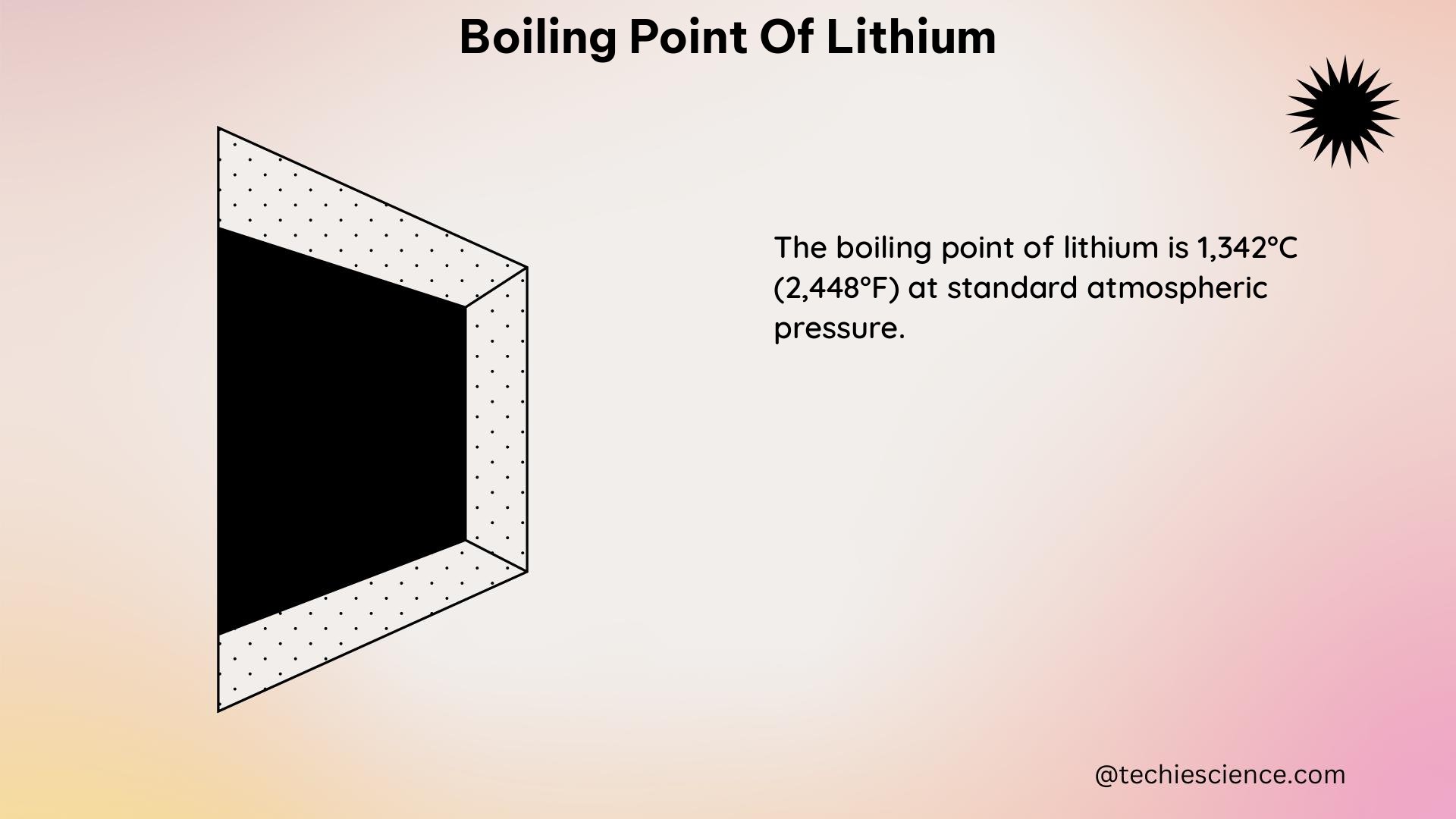The boiling point of lithium, a crucial physical property of this alkali metal, is 1342°C (1615 K; 2426°F). This value, determined by the strength of the interatomic forces within the lithium lattice, is a fixed characteristic that plays a vital role in understanding the behavior and applications of this versatile element.
Understanding the Boiling Point of Lithium
The boiling point of a substance is the temperature at which the vapor pressure of the liquid equals the pressure surrounding the liquid, and bubbles of vapor form inside the liquid. In the case of lithium, as the temperature increases, the kinetic energy of the atoms within the metal’s crystalline structure also rises. Once the atoms have accumulated enough energy to overcome the attractive forces holding them together, they can transition into the gaseous phase, resulting in the boiling phenomenon.
The boiling point of lithium is influenced by several factors, including:
-
Atomic Structure: Lithium, being the lightest of the alkali metals, has a relatively simple atomic structure with a single valence electron. This configuration contributes to the relatively low boiling point compared to other elements in the same group.
-
Intermolecular Forces: The strength of the intermolecular forces, or van der Waals forces, between lithium atoms plays a crucial role in determining the boiling point. These forces must be overcome for the atoms to transition into the gaseous state.
-
Pressure: The boiling point of lithium, like any substance, is also affected by the surrounding pressure. As the pressure increases, the boiling point rises, and vice versa. This relationship is described by the Clausius-Clapeyron equation:
ln(P2/P1) = (ΔHvap/R) * (1/T1 - 1/T2)
Where:
– P1 and P2 are the vapor pressures at temperatures T1 and T2, respectively.
– ΔHvap is the enthalpy of vaporization.
– R is the universal gas constant.
- Impurities: The presence of impurities in the lithium sample can also affect its boiling point, as the impurities can alter the intermolecular forces and the overall thermodynamic properties of the system.
Lithium’s Unique Physical and Chemical Properties

In addition to its boiling point, lithium possesses several other distinctive physical and chemical properties that contribute to its versatility and importance in various applications.
Physical Properties
-
Density: Lithium has the lowest density of any solid element, with a density of 0.534 g/cm³ at 20°C. This low density makes lithium an attractive material for lightweight applications.
-
Melting Point: Lithium has a relatively high melting point of 180.54°C (356.97°F), which allows it to remain solid at relatively high temperatures.
-
Thermal Conductivity: Lithium has a high thermal conductivity, making it useful in heat transfer applications.
-
Electrical Conductivity: Lithium is a good electrical conductor, with a conductivity of approximately 1.1 × 10^7 S/m at 20°C.
Chemical Properties
-
Reactivity: Lithium is highly reactive, readily forming compounds with a wide range of other elements. This reactivity is due to its single valence electron, which it can easily lose to form a positively charged ion.
-
Reducing Agent: Lithium’s high reactivity makes it a strong reducing agent, capable of reducing many other elements and compounds.
-
Electronegativity: Lithium has a low electronegativity value of 0.98 on the Pauling scale, indicating its tendency to lose its valence electron and form positive ions.
-
Oxidation States: Lithium primarily exists in the +1 oxidation state, reflecting its ability to lose its single valence electron.
Applications of Lithium and its Boiling Point
The unique properties of lithium, including its boiling point, make it a valuable element in a wide range of applications:
-
Batteries: Lithium is a key component in lithium-ion and lithium-polymer batteries, which are widely used in portable electronics, electric vehicles, and energy storage systems.
-
High-Temperature Alloys: Lithium’s high melting point and low density make it a useful alloying element in the production of high-temperature alloys, such as those used in aerospace and automotive industries.
-
Glass and Ceramics: Lithium compounds are used in the production of specialized glass and ceramic materials, where their ability to lower the melting point and improve thermal and chemical resistance is beneficial.
-
Nuclear Fusion: Lithium is used in the development of nuclear fusion reactors, where its low atomic number and ability to produce tritium through neutron bombardment make it a valuable component.
-
Lubricants: Lithium-based greases and lubricants are widely used in various industrial and automotive applications due to their excellent thermal stability and resistance to oxidation.
-
Air Purification: Lithium hydroxide is used in the purification of air, particularly in closed environments such as spacecraft and submarines, where it can effectively remove carbon dioxide.
-
Psychiatric Medications: Lithium salts, such as lithium carbonate and lithium citrate, are used in the treatment of bipolar disorder and other psychiatric conditions.
Conclusion
The boiling point of lithium, a fixed physical property of this alkali metal, is a crucial parameter that influences its behavior and applications. Understanding the factors that determine the boiling point, as well as the unique physical and chemical properties of lithium, is essential for scientists, engineers, and researchers working with this versatile element. By exploring the intricacies of lithium’s boiling point, we can gain valuable insights into its potential uses and continue to push the boundaries of scientific and technological innovation.
References:
- Freezing Point Depression and Boiling Point Elevation: Making Water Freeze Colder and Boil Hotter
- Melting Points and Boiling Points of Alkali Metals
- Lithium
- Lithium in Drinking Water
- Lithium Toxicity

The lambdageeks.com Core SME Team is a group of experienced subject matter experts from diverse scientific and technical fields including Physics, Chemistry, Technology,Electronics & Electrical Engineering, Automotive, Mechanical Engineering. Our team collaborates to create high-quality, well-researched articles on a wide range of science and technology topics for the lambdageeks.com website.
All Our Senior SME are having more than 7 Years of experience in the respective fields . They are either Working Industry Professionals or assocaited With different Universities. Refer Our Authors Page to get to know About our Core SMEs.